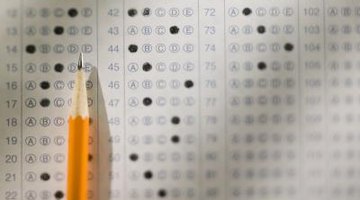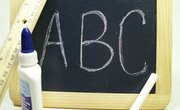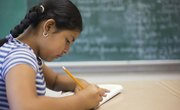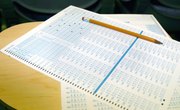"No Child Left Behind," a federal law designed to improve educational quality, has made achievement tests an important component of the educational landscape. Some states also mandate that middle schoolers, high schoolers and even college students take achievement tests to graduate or take certain classes. These tests can provide information about how much a student has learned, but they're far from perfect and many educators find that achievement tests can create barriers to the learning process.
Achievement vs. Aptitude
Achievement tests and aptitude tests are both standardized tests that compare students to other similar students. Aptitude tests, however, are designed to measure ability and basic skills as opposed to learning. For example, IQ tests examine a student's spatial reasoning and similar skills in comparison to children of the same age. Achievement tests, however, test a student's mastery of facts that are a part of the educational curriculum. Students take tests on American history, algebra, basic biology and similar subjects.
Teaching for Tests
A standard education contains both subjective and objective elements. Objective components of education include the memorization of facts and formulas, and can be measured by achievement tests. Subjective elements, such as a student's ability to actually understand and apply material, discussions about the material and life skills learned from the material are more challenging to measure. Many teachers have expressed frustration that achievement testing forces them to "teach to the test," neglecting subjective elements of education and rushing through lessons. Some teachers leave out material that is interesting or helpful because it is not on the test. A 2010 study published in the "Journal of Economic Perspectives," for example, emphasized that teachers support the general principles of achievement testing, but that they oppose the ways in which it has been implemented.
Passage Rates
Achievement test results can vary greatly from student to student and school to school, and one of the primary purposes of achievement testing is to determine which schools and teachers are most effective. The Chicago Tribune reports that, in Illinois, most students pass achievement tests, but few excel. In New Jersey, 78 percent of students passed achievement tests in 2011, but the numbers vary greatly depending upon a student's specific geographic location within the state, according to the Annie E. Casey Foundation.
Bias in Testing
Although achievement tests are designed to be as unbiased as possible, some bias still inevitably creeps in. A 2004 paper presented at a conference sponsored by the National Association of Test Directors emphasized that content in achievement tests may be biased on the basis of race, class or sex. For example, reading tests might contain stories that are only familiar to middle class children and this can alienate less privileged children, causing them to underperform. Math word problems might contain words unfamiliar to children from certain cultures, causing them to spend more time trying to figure out the meaning of the words than the solution to the problem. Test anxiety can also play a role and stereotype threat -- the tendency of students to perform poorly when reminded of stereotypes about their group -- can also interfere with results. Students are frequently asked information about their sex or gender at the beginning of tests and this can remind them of stereotypes, interfering with performance.
Related Articles
References
- Education.com: Standardized Testing
- Journal of Economic Perspectives: Teachers’ Views on No Child Left Behind -- Support for the Principles, Concerns about the Practices
- Saint Paul Public Schools: Test Bias or Cultural Bias -- Have We Really Learned Anything?
- The Annie E. Casey Foundation: Students Passing 8th Grade State Achievement Tests (Percent) – 2011
- Delusions of Gender; Cordelia Fine
- University of Maryland: No Child Left Behind's Emphasis on 'Teaching to the Test' Undermines Quality Teaching
Writer Bio
Van Thompson is an attorney and writer. A former martial arts instructor, he holds bachelor's degrees in music and computer science from Westchester University, and a juris doctor from Georgia State University. He is the recipient of numerous writing awards, including a 2009 CALI Legal Writing Award.











